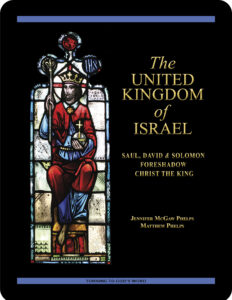 The United Kingdom of Israel:
The United Kingdom of Israel:
Saul, David & Solomon
Foreshadow Christ the King
Lesson 27 God Appears Again to Solomon
the First Book of the Kings 9:1—11:8
Revised Standard Version Catholic Edition (RSVCE)*
New American Bible Revised Edition (NABRE)*
Catechism of the Catholic Church
ex libris (in our library)
glossary for The United Kingdom of Israel
cross references in The United Kingdom of Israel
next lesson: The United Kingdom Dies with Solomon
This material coordinates with Lesson 27 on pages 163–168 in The United Kingdom of Israel: Saul, David & Solomon Foreshadow Christ the King.
“When your days are fulfilled and you lie down with your fathers, I will raise up your offspring after you, who shall come forth from your body, and I will establish his kingdom. He shall build a house for my name, and I will establish the throne of his kingdom for ever.”
—the Second Book of Samuel 7:12–13
welcome to our in-depth study of Saul, David & Solomon
We invite interested groups and individuals to check out the sample first lesson from this 28- lesson
lesson  Turning to God’s Word Catholic Bible study. These online study pages link to our free lesson videos, as well as to a glossary and cross references in the biblical text. Other study aids include maps, additional commentary, and prayers based on the primary Scripture in each lesson. The United Kingdom of Israel: Saul, David & Solomon Foreshadow Christ the King has been granted an imprimatur and may be purchased from our website shop. If you have a Bible-study question or comment, click on the “ask us your question” or “what do you think” button on any study page.
Turning to God’s Word Catholic Bible study. These online study pages link to our free lesson videos, as well as to a glossary and cross references in the biblical text. Other study aids include maps, additional commentary, and prayers based on the primary Scripture in each lesson. The United Kingdom of Israel: Saul, David & Solomon Foreshadow Christ the King has been granted an imprimatur and may be purchased from our website shop. If you have a Bible-study question or comment, click on the “ask us your question” or “what do you think” button on any study page.
open with prayer
It’s always wise to begin any Bible study with prayer, whether reading the Scriptures alone or meeting with others in a discussion study group. You can pray using your own words or use one of the opening prayers on our website. We especially like the following:
Lord Jesus, you promised to send your Holy Spirit
to teach us all things.
As we read and study your word today,
allow it to touch our hearts and change our lives. Amen.
let’s review—the First Book of the Kings 8:1–66
In Lesson 26 Solomon Dedicates the Temple, Solomon oversees installation of the ark of the covenant in the Temple and consecrates the building. His prayers focus on the Temple as the place to worship and he firmly establishes Jerusalem as the centralized location for worship for descendants of Jacob. Although there’s a clear need for standardization of worship practices, Solomon somewhat oversteps in assuming the type of house the LORD was referring to when David was promised an eternal kingdom to some future unnamed descendant. Nevertheless, Solomon issues prophetic words concerning the future of the kingdom when worship at the Temple in Jerusalem no longer will be an option.
map notes—Galilee; Sheba; Ophir
The First Book of the Kings 9:10–12 tell of King Hiram’s displeasure with Solomon’s gift of 20 cities in Galilee. Although the biblical text doesn’t spell out the reason why Hiram is unsatisfied with the 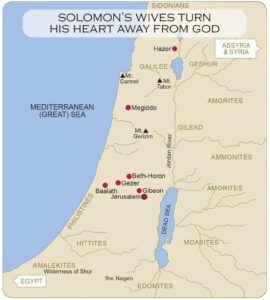 cities, which are in reasonably close proximity to his kingdom, it’s likely that the economy of the cities in Galilee was based on agriculture, while Tyre’s economy was based on sea trade. Scholars are unsure of the exact locations of Sheba and Ophir. Most believe that Sheba refers to present-day Ethiopia, which is located near the eastern coastline of the continent of Africa just south of the Sinai Peninsula. The First Book of the Kings 10:22 records that once every three years Solomon’s ships returned from Ophir with gold, silver, ivory, apes, and peacocks—in addition to almug wood, which is native to southern India. The almug tree yields heavy, fine-grained wood that’s black on the surface but polishes to a rich garnet color. In addition to being strong, the wood is antiseptic, making it impervious to termites and other insects Click on the map (above right) to enlarge it. The original map is on page 166 in The United Kingdom of Israel: Saul, David & Solomon Foreshadow Christ the King.
cities, which are in reasonably close proximity to his kingdom, it’s likely that the economy of the cities in Galilee was based on agriculture, while Tyre’s economy was based on sea trade. Scholars are unsure of the exact locations of Sheba and Ophir. Most believe that Sheba refers to present-day Ethiopia, which is located near the eastern coastline of the continent of Africa just south of the Sinai Peninsula. The First Book of the Kings 10:22 records that once every three years Solomon’s ships returned from Ophir with gold, silver, ivory, apes, and peacocks—in addition to almug wood, which is native to southern India. The almug tree yields heavy, fine-grained wood that’s black on the surface but polishes to a rich garnet color. In addition to being strong, the wood is antiseptic, making it impervious to termites and other insects Click on the map (above right) to enlarge it. The original map is on page 166 in The United Kingdom of Israel: Saul, David & Solomon Foreshadow Christ the King.
 God has a chat with Solomon (20:27)
God has a chat with Solomon (20:27)
In the video overview for Lesson 27, “God Appears Again to Solomon,” Turning to  God’s Word author Matthew Phelps discusses God’s second appearance to Solomon. Here God spells out for Solomon the negative consequences of the covenant. Careful readers will notice a significant contradiction. How can God dwell forever in the Temple at Jerusalem if at the same time the LORD also expresses no hesitation to wipe it out? The answer is tied to understanding the Temple as the place where God’s name dwells. In the book of Exodus 3:14, the LORD’s name or identity is in essence “being.” It seems like a no-brainer to present-day Christians that God never really intended to dwell in a house of stone. The house or Temple that God intends as his eternal dwelling with humanity is Jesus.
God’s Word author Matthew Phelps discusses God’s second appearance to Solomon. Here God spells out for Solomon the negative consequences of the covenant. Careful readers will notice a significant contradiction. How can God dwell forever in the Temple at Jerusalem if at the same time the LORD also expresses no hesitation to wipe it out? The answer is tied to understanding the Temple as the place where God’s name dwells. In the book of Exodus 3:14, the LORD’s name or identity is in essence “being.” It seems like a no-brainer to present-day Christians that God never really intended to dwell in a house of stone. The house or Temple that God intends as his eternal dwelling with humanity is Jesus.  Learn how Jesus’ name expands on God’s identity in a way that actually is able to bring about the things that Solomon requested in his prayers of consecration.
Learn how Jesus’ name expands on God’s identity in a way that actually is able to bring about the things that Solomon requested in his prayers of consecration.
The Scripture ranges for the videos that accompany this Catholic Bible study match the Scripture ranges for the sets of questions in The United Kingdom of Israel: Saul, David & Solomon Foreshadow Christ the King. You can follow along as Turning to God’s Word author Matthew Phelps discusses Lesson 27, “God Appears Again to Solomon,” on pages 163–168 in the study book.
can Solomon offer sacrifices if he’s not a priest?
Yes and no. The First Book of the Kings 9:25 records that three times a year Solomon offered up burnt offerings and peace offerings. The biblical text is unclear about whether Solomon did this himself or whether a priest made these offerings on his behalf. The First and Second Books of Samuel pointed toward a weakening priesthood. Although Solomon begins his 40-year reign as a devout king, after the construction of the Temple his piety and devotion to the LORD appear to wane. The  Turning to God’s Word Catholic Bible study The Letter to the Hebrews: An Explanation of the Mechanism of Our Salvation offers more information about how Jesus changes the Old Testament priesthood.
Turning to God’s Word Catholic Bible study The Letter to the Hebrews: An Explanation of the Mechanism of Our Salvation offers more information about how Jesus changes the Old Testament priesthood.
Spirit—you could look it up in our archives
 The First Book of the Kings 10:5 describes the reaction of the Queen of Sheba after she meets Solomon and sees the splendor of his kingdom: “There was no more spirit left in her.” To learn why a better translation might be: “Solomon took her breath away,” read Lost in Translation, an online column in which Turning to God’s Word author Matthew Phelps helps readers connect with ideas expressed in the original languages of the Scriptures. New Lost in Translation entries are posted on Mondays, and past entries are archived on our website. Contact us if you’d like to receive Lost in Translation by email every week.
The First Book of the Kings 10:5 describes the reaction of the Queen of Sheba after she meets Solomon and sees the splendor of his kingdom: “There was no more spirit left in her.” To learn why a better translation might be: “Solomon took her breath away,” read Lost in Translation, an online column in which Turning to God’s Word author Matthew Phelps helps readers connect with ideas expressed in the original languages of the Scriptures. New Lost in Translation entries are posted on Mondays, and past entries are archived on our website. Contact us if you’d like to receive Lost in Translation by email every week.
 pray with the Psalms—an injunction against worshiping foreign gods
pray with the Psalms—an injunction against worshiping foreign gods
Psalm 81 specifically prohibits the descendants of Jacob from worshiping any strange or foreign god, reminding the people that it’s the LORD who freed them from slavery in Egypt. This echoes the first of the Ten Commandments as well as God’s reminder to Solomon in the First Book of the Kings 9:9 that the king is to love and serve the LORD. Prayed at Thursday Lauds (Week I),  Psalm 81 is included as part of Lesson 10 Awake, My Soul! in the Turning to God’s Word Catholic Bible study Sing a New Psalm: Communicating with God Through the Prayers of the Church—Volume I: Lauds & Vespers.
Psalm 81 is included as part of Lesson 10 Awake, My Soul! in the Turning to God’s Word Catholic Bible study Sing a New Psalm: Communicating with God Through the Prayers of the Church—Volume I: Lauds & Vespers.
WHAT DO YOU THINK about the the law for kings?
The book of Deuteronomy 17:14–20 lists three specific commandments that kings of the descendants of Jacob are required to follow.
 ? The First Book of the Kings 4:24–28 indicates that Solomon chose to ignore the first of these rules—the injunction against “multiplying” horses (maintaining a large stable). What might be the reason that God forbids the kings to own a lot of horses?
? The First Book of the Kings 4:24–28 indicates that Solomon chose to ignore the first of these rules—the injunction against “multiplying” horses (maintaining a large stable). What might be the reason that God forbids the kings to own a lot of horses?
? In the book of Deuteronomy 17:14–20, the other two things God forbids his kings to “multiply” are gold and wives. Consider why God would place injunctions against his kings amassing gold and wives.
? According to the First Book of the Kings 10:14, Solomon collects 666 talents of gold in one year. The number 666 also appears in the thirteenth chapter in the book of Revelation. What symbolic meaning does the author of the  book of Revelation assign to that number? For more information, read the online study page accompanying Lesson 14 Men Worshiped the Dragon in the Turning to God’s Word Catholic Bible study The Revelation of Jesus Christ: The Faithful Witness.
book of Revelation assign to that number? For more information, read the online study page accompanying Lesson 14 Men Worshiped the Dragon in the Turning to God’s Word Catholic Bible study The Revelation of Jesus Christ: The Faithful Witness.
? According to the First Book of the Kings 11:1–3, how many wives, princesses, and concubines does Solomon have?
? What danger do they pose?
? Consider which of the three rules that Solomon ignores is most responsible for pulling him out of right relationship with the LORD.
? The three things represented by horses, gold, and wives are power, money, and sex, respectively. Consider whether these things have the potential to draw people away from worship of God in the present day.
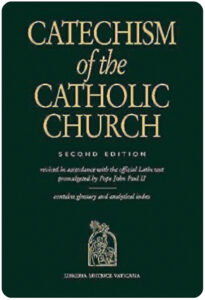 the best Catholic commentary about Scripture
the best Catholic commentary about Scripture
To find out more about how Church teaching is supported by Scripture passages in The United Kingdom of Israel: Saul, David & Solomon Foreshadow Christ the King, check out the Index of Citations in the Catechism of the Catholic Church. Links (Revised Standard Version Catholic Edition [RSVCE*]) to the primary Scripture passages in the lesson and relevant paragraphs in the Catechism are provided here. Not every passage in the biblical text for this Catholic study is referenced in a Catechism paragraph, however, including the passage in this lesson from the First Book of the Kings 9:1—11:8.
ways our glossary might prove helpful
In addition to providing extra information about geographical locations, our glossary also points out  persons and places mentioned in the biblical text under multiple names or spellings. If you can remember a name but aren’t sure in which lesson it shows up, you can find it in the glossary, which lists every proper noun that appears in the primary biblical text for The United Kingdom of Israel: Saul, David & Solomon Foreshadow Christ the King.
persons and places mentioned in the biblical text under multiple names or spellings. If you can remember a name but aren’t sure in which lesson it shows up, you can find it in the glossary, which lists every proper noun that appears in the primary biblical text for The United Kingdom of Israel: Saul, David & Solomon Foreshadow Christ the King.
to learn more, read more Scripture
If you’re having difficulty with a particular passage of Scripture, it can be helpful to read the relevant  cross references—but looking these up can take time. To make that easier, we’ve compiled the cross references from the Revised Standard Version Second Catholic Edition (RSV2CE)—the translation that we reprint in our study books. That list can be found at the top of every online study page, and it includes links to cross references in the primary biblical text for The United Kingdom of Israel: Saul, David & Solomon Foreshadow Christ the King.
cross references—but looking these up can take time. To make that easier, we’ve compiled the cross references from the Revised Standard Version Second Catholic Edition (RSV2CE)—the translation that we reprint in our study books. That list can be found at the top of every online study page, and it includes links to cross references in the primary biblical text for The United Kingdom of Israel: Saul, David & Solomon Foreshadow Christ the King.
don’t forget about our indexes & extra online material

 If you’re trying to locate information about a specific Scripture passage, you can look it up in the index at the back of the study book or sample lesson. If you want to find a particular commentary, you can look up its title in the topics index. To learn more about another book of the Bible for which there’s a Turning to God’s Word study, visit the online study directories to read the commentaries and watch any accompanying videos. Finally, if you have a question or would like to make a comment about any of our studies, you can use one of the “ask us your question” or “what do you think” buttons to email our authors.
If you’re trying to locate information about a specific Scripture passage, you can look it up in the index at the back of the study book or sample lesson. If you want to find a particular commentary, you can look up its title in the topics index. To learn more about another book of the Bible for which there’s a Turning to God’s Word study, visit the online study directories to read the commentaries and watch any accompanying videos. Finally, if you have a question or would like to make a comment about any of our studies, you can use one of the “ask us your question” or “what do you think” buttons to email our authors.
ex libris—Church documents & books about religious topics
Link to magisterial documents referred to in our Bible studies at ex libris—magisterial documents.  This listing includes significant recent encyclicals as well as a number of historical Church documents. Recommended books related to Scripture study can be found at ex libris—main bookshelf.
This listing includes significant recent encyclicals as well as a number of historical Church documents. Recommended books related to Scripture study can be found at ex libris—main bookshelf.
wondering how to pronounce some of these words?
The following link is to a reading from the New International Version (NIV) Bible. To listen, click on the audio icon above the printed text. Although not taken from the translations used in our study materials, the NIV reading provides an audio guide to pronunciation of words in this lesson’s primary biblical text. A close online version of the translation of the Bible used in Catholic liturgy in the United States as well as an audio guide for daily Mass readings for the current month can be found on the website of the United States Conference of Catholic Bishops (USCCB).
the First Book of the Kings 9:1—11:8 (NIV)
 close with Bible-based prayer related to this lesson
close with Bible-based prayer related to this lesson
Many of our Catholic study groups like to conclude their discussions with a prayer based on the scriptural focus of their lesson, and some participants include Scripture-specific prayer in their individual study. If you’re uncomfortable composing your own Bible-based prayers you can follow our four easy steps. If you prefer, you can use the following prayer based on the biblical text in this lesson in the study book The United Kingdom of Israel: Saul, David & Solomon Foreshadow Christ the King.
O God, you created the world and all that’s in it.
Help us to appreciate the goodness of material things
while at the same time avoiding selfishness and greed.
Teach us to use whatever power we’ve been given
to promote greater respect and love for you.
Grant that we include you in all of our relationships.
We ask this in the name of Jesus Christ, who taught
that love is the greatest commandment. Amen.
Lesson 28 The United Kingdom Dies with Solomon—the First Book of the Kings 11:9—12:24
Lesson 26 Solomon Dedicates the Temple—the First Book of the Kings 8:1–66
you also may like our study of the book of Genesis
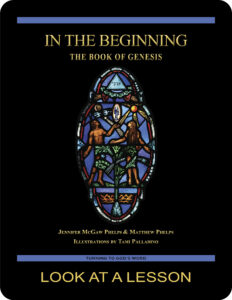 The first seven lessons of In the Beginning: The Book of Genesis, a 28-lesson Catholic Bible study with an imprimatur, provide an in-depth look at the very earliest biblical history—including the two accounts of Creation, events surrounding the Fall of Adam and Eve, the relationship between Cain and Abel, and the baptismal foreshadowing present in the account of Noah and the Flood. Remaining lessons look at lives of the patriarchs Abraham, Isaac, Jacob, and Joseph. Click on the book’s cover to view a sample lesson.
The first seven lessons of In the Beginning: The Book of Genesis, a 28-lesson Catholic Bible study with an imprimatur, provide an in-depth look at the very earliest biblical history—including the two accounts of Creation, events surrounding the Fall of Adam and Eve, the relationship between Cain and Abel, and the baptismal foreshadowing present in the account of Noah and the Flood. Remaining lessons look at lives of the patriarchs Abraham, Isaac, Jacob, and Joseph. Click on the book’s cover to view a sample lesson.
start a Turning to God’s Word Bible study
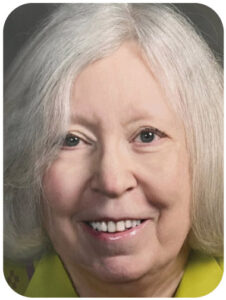 Thank you for your interest in The United Kingdom of Israel: Saul, David & Solomon Foreshadow Christ the King.
Thank you for your interest in The United Kingdom of Israel: Saul, David & Solomon Foreshadow Christ the King.  Information about beginning a Turning to God’s Word Bible study can be found at start a Bible study. Tami, Matthew, and I are available to answer questions. Contact us if you’d like to start one of our studies or have your schedule listed with other TtGW study groups on our website. —Jennifer
Information about beginning a Turning to God’s Word Bible study can be found at start a Bible study. Tami, Matthew, and I are available to answer questions. Contact us if you’d like to start one of our studies or have your schedule listed with other TtGW study groups on our website. —Jennifer
*There are seven deuterocanonical books in the Old Testament—the Books of Tobit, Judith, Wisdom, Sirach, Baruch, and First and Second Maccabees, as well as some passages in the Books of Esther and Daniel. Protestants usually refer to these works as “apocryphal,” a word that means “outside the (Protestant) canon” because they’re excluded from most Protestant Bibles. The word “deuterocanonical” means “second canon”; Catholics use that word to refer to any section of the Catholic Old Testament for which there are no extant, or existing, Hebrew manuscripts. All of the deuterocanonical books appear in the Septuagint, the earliest remaining versions of which date to the 1st century B.C. This Greek translation of the Old Testament was in common use by Jews at the time of Jesus—but the same books aren’t found in existing Hebrew manuscripts, which aren’t as old as the oldest version of the Septuagint. Learn more by reading How Do Catholic & Protestant Bibles Differ?
Turning to God’s Word printed Bible studies use the 2006 Revised Standard Version Second Catholic Edition (RSV2CE) translation for all Scripture references except those to the Psalms, which are taken from The Abbey Psalms and Canticles, prepared by the Benedictine monks of Conception Abbey and published in 2020 by the United States Conference of Catholic Bishops (USCCB). All Scripture links for the online study pages for The United Kingdom of Israel: Saul, David & Solomon Foreshadow Christ the King are to the 1966 Revised Standard Version Catholic Edition (RSVCE) translation. The New International Version (NIV) audio recordings follow the same chapter and verse numbering as the RSV Catholic translations, but the NIV translation doesn’t include the deuterocanonical books and passages.
The 1966 RSVCE uses archaic pronouns and verb forms such as “thee,” “thou,” “didst” in the Psalms and in direct quotations attributed to God. The 2006 RSV2CE replaces those with more accessible English. The few significant translation changes in the RSV2CE include rendering almah as “virgin” in the Book of Isaiah 7:14 and restoring the term “begotten” in the Gospel According to John 3:16.
Numbering varies for some passages in this Bible study. Turning to God’s Word studies (print and digital) follow the numbering in the Revised Standard Version Catholic translations (RSV2CE and RSVCE). Discrepancies in the New American Bible Revised Edition (NABRE) are noted in the Index of Scripture Citations in the study book and the online sample.
 You can learn more about the Psalms by viewing a sample lesson from the Turning to God’s Word Catholic Bible study Sing a New Psalm: Communicating with God Through the Prayers of the Church—Volume I: Lauds & Vespers. The second part of that study, Sing a New Psalm: Communicating with God Through the Prayers of the Church—Volume II: Vigils, Day Prayer & Compline, is scheduled for publication in 2025. Some verse numbers may vary in different translations of the Psalms.
You can learn more about the Psalms by viewing a sample lesson from the Turning to God’s Word Catholic Bible study Sing a New Psalm: Communicating with God Through the Prayers of the Church—Volume I: Lauds & Vespers. The second part of that study, Sing a New Psalm: Communicating with God Through the Prayers of the Church—Volume II: Vigils, Day Prayer & Compline, is scheduled for publication in 2025. Some verse numbers may vary in different translations of the Psalms.
